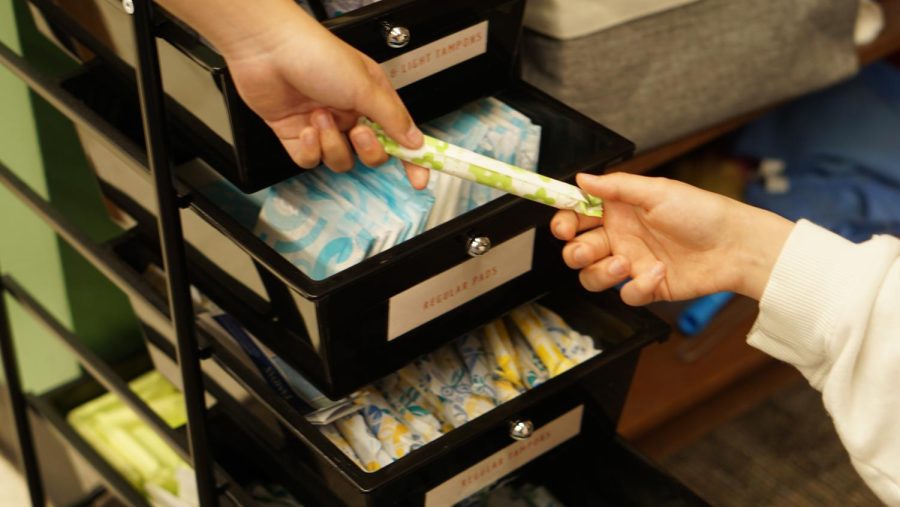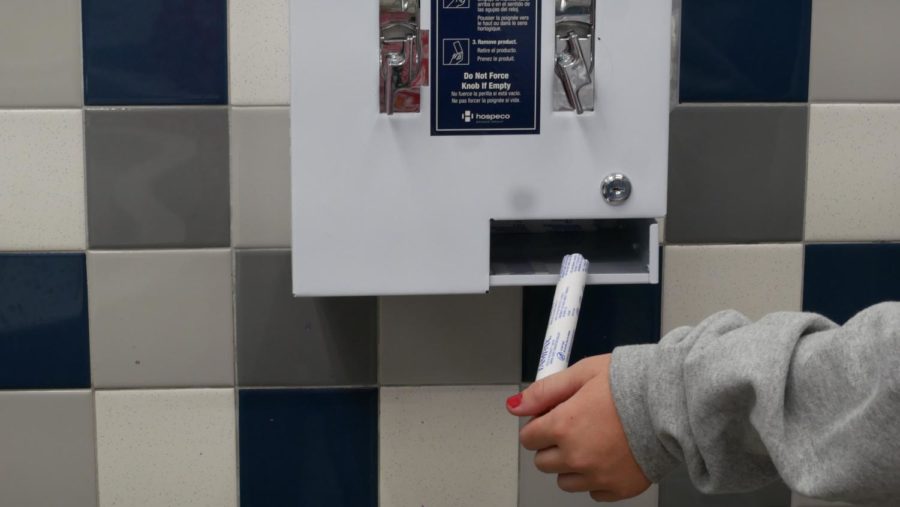On June 20, AISD released the decision to implement free feminine hygiene products in schools to better accommodate students’ needs, increase gender equity, and combat period poverty.
Prior to the start of this school year, menstrual product dispensers were installed in the women’s and gender-neutral bathrooms at McCallum, allowing students to access products without having to purchase or request them.
Michelle Wallis, executive director of AISD’s Office of Innovation & Development and the Austin Ed Fund, AISD’s nonprofit education foundation, played a large role in implementing the district’s decision.
The issue was brought to her attention by a member of the Austin Ed Fund Board who was concerned about the accessibility of feminine hygiene products in AISD schools.
“When we dug into the issue, we realized a few things: Access was spotty, there were a few schools that provided products, but most did not,” Wallis said.
After further research, Wallis and her team concluded that students face financial, social, emotional, and practical barriers to accessing feminine hygiene products. For example, a 2019 study commissioned by Thinx & PERIOD showed that 1 in 5 teens struggle to afford feminine hygiene products, predominantly students of low-income and minority backgrounds. Additionally, two-thirds of students agreed that too many people have to miss out on valuable school time because of their lack of access to menstrual products.
In response, Wallis and her team were able to construct a plan with AISD’s Operations team for the 2022-2023 school year, allocating $85,000 for dispensers and continual expenses.
“I think this will reduce barriers to learning and destigmatizing and normalizing this as a basic need,” Wallis said.
According to the Alliance for Period Supplies, 17 states including Washington, DC passed legislation that went into effect on July 22 ensuring students access to free menstrual products at school. Legislation varies widely between states as some mandates are backed with state funding, while others are unfunded. Additionally, the state’s bills differ in the level of education which will receive free period products.

Wallis felt that AISD’s decision was prompted by this trend in other school districts and industries recognizing menstrual products as a necessity.
“It felt more like an opportunity. I’m very proud of the team we worked with that put this in place,” Wallis said.
Principal Nicole Griffith similarly feels that this was an essential decision on the district’s part as feminine hygiene products are a necessity for over half of McCallum’s student population.
“To me, it equates to toilet paper,” Griffith said. “You wouldn’t have a school without toilet paper, which is also a mandatory product.”
Although menstrual products were offered last year in the library, it still required students to request them from a teacher or faculty member. Griffith is pleased with the implementation of the dispensers in bathrooms as it allows students to maintain their privacy.
“As an educator, I always felt really bad when you could tell that some girls are really embarrassed [to ask for period products],” Griffith said. “It is your bodily function so it’s private, even if it’s not embarrassing it’s still private. You shouldn’t have to ask anyone.”
Assistant principal Tamara Stone supports the decision to implement free products as she feels it is a crucial step in making the school an equitable environment.
“It’s like food and security,” Stone said. “Period products are an added expense of just being a woman or having a uterus.”
During her time at McCallum, Stone recalls herself and female faculty having to personally purchase period products to stock the campus with, to accommodate themselves and students. She feels that the new availability of free products will make life easier for everyone.
“It’s like if you don’t have a pencil you ask somebody for it, but if you don’t have a tampon or a pad now you can grab it, so I think it makes life easier. I just think it makes it easier to be a woman at school,” she said.
Junior Cecilia Cortez, former women’s studies student, hopes that this change will encourage a more open dialogue about periods to remove the stigma and shame around natural bodily function.
“I think it’s definitely long overdue and I’m glad they [period products] are so widely accessible now! I think that it is a start to breaking the stigma that comes with periods and hopefully it can help change it from being a taboo subject,” Cortez said.
Cortez believes that the institution of free feminine hygiene products will support students of low-income families to create widespread access to necessities, starting with period products.
“Hopefully, this is a positive change and allows low-income students who don’t have access to products outside of school a solution,” they said.
Katie Peterson, McCallum graduate and former Feminist Club president, ran multiple period product drives at McCallum last year seeking to provide students and faculty with easy access to products. She feels that the institution of free products is long overdue and is relieved that this issue is now resolved.
“I always felt kind of bad asking the students and staff to donate the product that they would ultimately be using,” Peterson said. “Now the people who need it will have direct access to it, at no cost to them. As inflation rises the cost of essentials such as products continues to increase. Our government has clearly shown that they will not provide subsidies for these essentials. It is increasingly important for schools to provide these products.”
Peterson is optimistic for the district’s future as she feels this decision will reduce inequities and better support students.
“It’s really amazing and it’s a huge step in the right direction to end [period] poverty throughout the district,” Peterson said. “If they keep the product stocked and readily available to the student and staff body then I think it will be a great improvement to the quality of life.”
This story was originally published on The Shield Online on September 19, 2022.




































